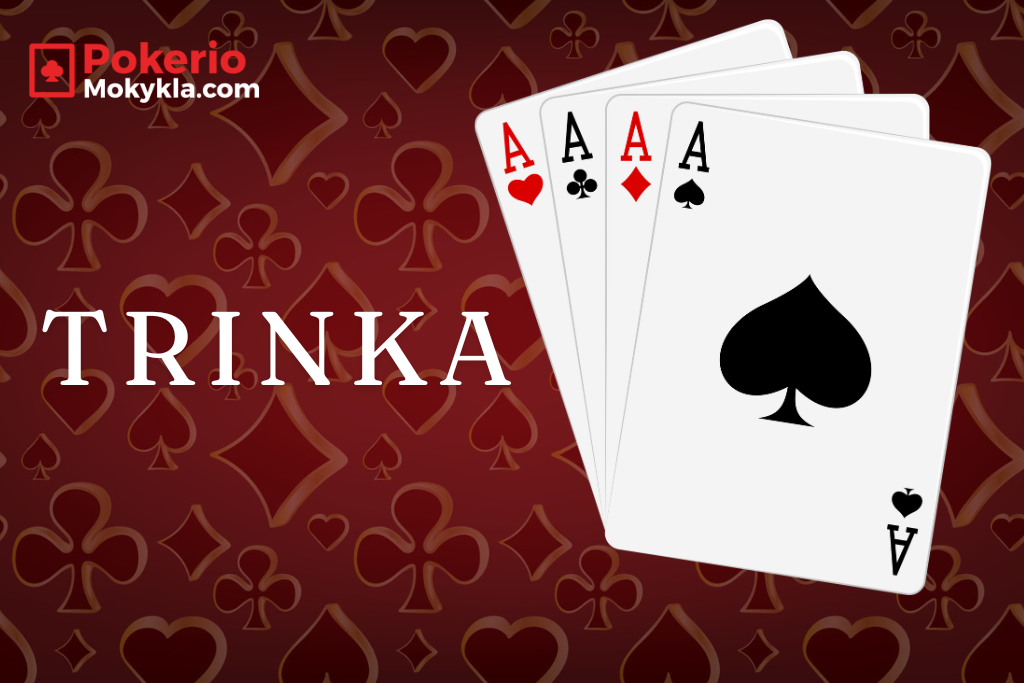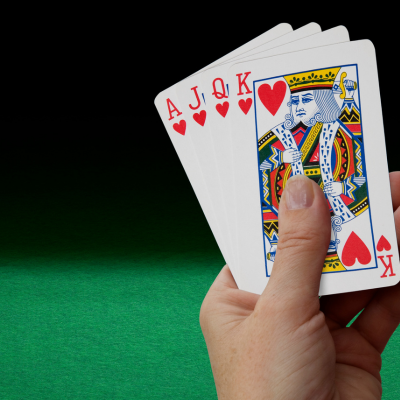Trinka card game – a gambling game that came to Lithuania from Eastern Europe and is widely played, reminiscent of poker or Black Jack.
The rules and nuances of this Trinka game are somewhat simpler and do not require many strategies, so colloquially, Trinka is considered a fun alternative to the most popular gambling games.

How many players play?
Trinka can be played by two to eight people.
Best online casinos
Trinka game – necessary tools
Played with a standard deck of cards – from nines to aces. P.S. if more players are playing, more cards are used, as each player must get at least 3 cards and some cards must be set aside for the pot.
Card rank order: 
Ace – 11 points
Ten – 10 points
Nine – 9 points
King – 8 points
Queen – 7 points
Jack – 6 points
Cards in “Trinka” are evaluated in two ways – as a certain set and as a collection of received cards.
Any set is still of greater value than a collection of individual cards, whose value is measured by the total points of the collected cards.
Card sets (from highest to lowest)
Corners – three cards of the same rank, for example, three jacks or three kings. The value of the set is determined by the rank of the cards that make it up: the lowest value is three nines (27 points), the highest is three aces (33 points).
Trinka – three cards of the same suit (diamonds, hearts, spades, clubs). If both players have a trinka, the higher value card is considered the one with the higher total points. The highest value trinka consists of an ace, ten, and nine.
KQV – king, queen, and jack, but all must be collected from different suits (e.g., hearts jack, clubs king, and diamonds queen).
Empty (logs, yeast) – nine, ten, and ace (total points equal to 0), but again all must be from different suits.
Two stakes – two aces and any other card. This set is sometimes called Twenty-two, for example, diamonds ace, clubs ace, and clubs king – their total points equal 22.
Eye – a set whose value is equal to 21 points. Only the points of cards from one suit are summed (e.g., hearts queen and hearts nine).
“Trinka” glossary
As mentioned earlier, there are many variations, rules, and even move names for this game.
We will provide some explanations if you encounter certain ambiguities while playing.
- Boil – reshuffle the cards.
- Pound – a pound offer is like asking if the player after you wants to replay the game.
- Penalty – if another player offers you a pound and you do not agree, you can receive a penalty for that.
- Logs (yeast) – worthless cards with a total point value of 0.
- Pass – continue the game by throwing money into the pot.
- Play blind – play without seeing the cards. You can play blind when it is your turn. When playing blind, you must throw in a predetermined but doubled amount into the pot.
- Stake – a predetermined bet amount.
- Pot – the place where the money is placed.
- Fold (drop) – withdraw from the game.
- Join – if you drop out of the game, you can rejoin when that round is replayed. You can join by contributing half of the collected pot amount, for example, if the pot is 10 euros, to continue playing, you need to contribute 5 euros to the pot.
- Trinka – 3 collected cards of the same rank, for example, 3 aces or 3 kings.
- Flush – 3 cards of the same suit, for example, 3 hearts or 3 diamonds.
- Joker – some players include jokers in the game, which can substitute for any card you need at that moment.
How to play Trinka?
Game objective
The main goal of “Trinka” is to win the pot, which is formed from the players' stakes. The players' task is to collect a set called trinka – a certain number of cards and points.
So, players compete against each other, and the player who scores the most points and collects the trinket is declared the honorable winner. Quite often, players believe that this game can only be won by getting very good, high-scoring cards. If the cards are unfavorable, bluffing is the only option, and only by mastering it well can one win.
Game Progress
First of all, the cards need to be dealt, but before each deal, players put a pre-agreed minimum amount into the pot, which in the game is called an ante (let's say in this case it is 1 euro). The chosen dealer shuffles the deck and gives it to the player sitting to his right to cut.
The latter decides how the game's Trinka cards will be dealt. Each player is given three cards – they can be dealt one at a time three times, all three at once, or two at a time and then one. The remaining cards are set aside after the deal.
The game proceeds counterclockwise. The first player to start is the one sitting to the left of the dealer. The first player is somewhat lucky because he has a choice – he can continue playing (put an additional ante into the pot and increase it, say to 2 euros), or propose to redeal the cards – in Trinka, this action is called boiling.
Of course, it should be remembered that to boil, the consent of all players is required. If agreed, then each player again adds the pre-agreed minimum amount to the pot, and the player who proposed the redeal shuffles and becomes the dealer and deals the cards.
Players announce their decision – to redeal the cards or continue playing – in turn. If at least one player does not agree to boil the cards, the player who made the proposal can ask them to pay a penalty. The size of the penalty (like the initial minimum ante) is agreed upon in advance (say 2 euros).
Here the fun begins – the player who asked for the penalty must pay it himself. If the penalized player decides not to continue playing, he must put the same amount into the pot as the penalizing player (2 euros), but if he continues to play, he puts in double the amount (4 euros).
The game continues in this manner until those who do not want to continue playing drop out, leaving only two players who face off in the final showdown. Then these two again put the pre-agreed minimum amount into the pot and reveal their cards.
Winner
The pot is won by the player who has more points or has collected a higher value set of cards. If players collect the same number of points, the pot is contested again.
Thus, this gambling game is popular among people of various ages not only in Eastern Europe but also around the world, and therefore more and more online versions of the game are gradually appearing.
Remember, you should first play for your own enjoyment, not just for the desire to win.





